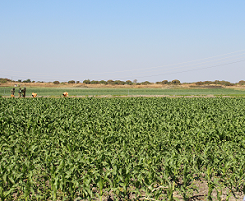January 2013
- Posting by PRAWA
- Zambia
 The organization and methods of work in the institutions shall resemble as closely as possible those of similar work outside institutions, so as to prepare prisoners for the conditions of normal occupational life (UNSMR Rule 72).
The organization and methods of work in the institutions shall resemble as closely as possible those of similar work outside institutions, so as to prepare prisoners for the conditions of normal occupational life (UNSMR Rule 72).
Open Air Prisons were established in Zambia with the aim of decongesting prisons and providing community based corrections and extensions. The major focus of these prisons is the Agricultural production of food and cash crops for prisons sustenance and acquisition of agricultural skills by prisons inmates in order to ensure their self-reliance upon release.
According to the Global Finance website, Agriculture accounted for about 21.5% of the Zambian GDP in 2011. The agriculture sector in Zambia has been identified as a key driver of the economy due to its high potential to diversify the economy from total dependence on mining that has suffered major setbacks following the fall in metal prices on the international markets in the early 1990s.
Prisons are aware of the tremendous role agriculture is playing in the economic development of Zambia and as a result of that, in Zambian prisons like Kalonga Prison Farm, inmates’ rehabilitation process also includes individual ownership of farms in order to encourage a sense of responsibility, entrepreneurship and preparation for reintegration into the community upon release.
According to Rule 65 of the UNSMR, The treatment of persons sentenced to imprisonment or a similar measure shall have its purpose, so far as the length of the sentence permits, to establish in them the will to lead law abiding and self-supporting lives after their release and to fit them to do so. The treatment shall be such as will encourage their self-respect and develop their sense of responsibility.
In the Kalonga Prison Farm, prisoners are permitted to manage their own individual farms within the Prison. Products from these individual farms can be used by the inmates to meet several dietary needs or exchanged (with the Prison administration) for products they might require.
This process encourages the development of a sense of responsibility and discipline in the inmates in the process of farm management. Skills acquired encourage self dependence and as a result of this at the end of their incarceration they can eke out a living in the society.
